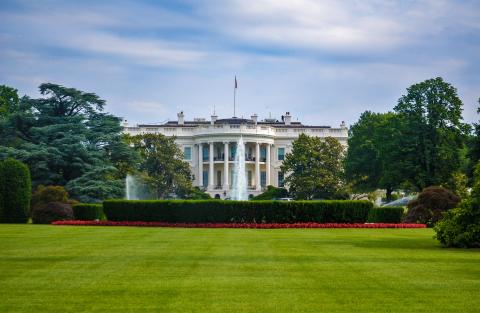
The Maryknoll Office for Global Concerns signed the following letter to President Biden urging him to complete a review of U.S. sanctions policy.
September 7, 2021
Dear President Biden,
As a coalition of civil society organizations working to protect and advance humanitarian, peacebuilding, peace advocacy, and human rights missions, we write to urge you to complete the administration’s sanctions policy review as expeditiously as possible, to make its findings public, and to implement significant and structural changes to U.S. sanctions policy.
When your administration first announced its review of U.S. sanctions policy, our community was encouraged to hear that it would seek to address the negative impacts of sanctions on humanitarian access. We were similarly encouraged to hear Peter Harrell, the Senior Director of International Economics and Competitiveness with the National Security Council, say that “the goal of sanctions should not be to punish ordinary citizens for the actions of their leaders.”
Yet some seven months into the review, steps to ensure that sanctions do not punish ordinary citizens for the actions of their leaders have been few and far between. With the exception of three “general licenses” issued in mid-June for Syria, Iran and Venezuela that merely clarified existing regulations, there have been no significant steps taken to address the deleterious impact of sanctions on humanitarian aid and peacebuilding programs and the well-being of individuals in sanctioned locations.
Meanwhile, the administration has apparently walked away from a campaign promise to pursue normalized relations with Cuba, instead doubling down on the embargo and imposing new sanctions. It has also maintained Trump-era policies of “maximum pressure” in the form of sanctions on Iran, Venezuela and North Korea, despite the serious impediments they create for humanitarian programs.
As United Nations human rights experts recently reiterated, “Many people around the world are being denied the right to development – both their countries’ economic improvement and their own personal development – because of unilateral coercive measures.” These experts then called on countries like the United States that impose unilateral sanctions to “withdraw or at least to minimize them to guarantee that the rule of law and human rights, including the right to development, are not affected.” Ensuring that sanctions comply with international law is essential to positioning the United States as an effective and sincere advocate for human rights.
Our coalition stands ready to contribute to the policy review and offer our expertise regarding the unintended consequences of sanctions. We believe we have valuable insight to share, and your administration has said it seeks such input. However, at a recent UN meeting on “Overcoming Challenges in Situations of Armed Conflict and Counter-Terrorism Operations,” U.S. Ambassador Jeffrey DeLaurentis, the Senior Advisor for Special Political Affairs at the U.S. Mission to the UN, said that “the U.S. is in constant dialogue with our humanitarian non-governmental partners, UN agencies, and others on how sanctions may impact their work.” While we were encouraged by an initial meeting on these issues, it has not been our experience that the administration is in “constant dialogue” with non-governmental organizations during the course of this sanctions review.
We remain hopeful that the conclusion of the sanctions review will result in more significant steps to mitigate the harm caused by sanctions; however, the administration’s recent lack of engagement with our community on the status and content of the review, its failure to offer a distinct timeline for its completion, and its failure to take even temporary stop-gap measures to improve the global response to COVID-19 give us pause.
If your administration is in fact committed to engaging with and addressing the concerns of civil society organizations impacted by sanctions, we call on you to clarify the timeline for the conclusion of the sanctions policy review, to make the findings of the review public, and to implement the following policy shifts to address the harmful impacts of sanctions:
1. Indefinitely suspend broad-based sanctions on civilian sectors that cause significant economic damage and leave populations more exposed to sickness and disease, food insecurity, and other humanitarian emergencies.
2. Restore the humanitarian exemption allowed by the International Emergency Economic Powers Act (IEEPA) by amending the executive orders that have cancelled it.
3. Issue a Global Temporary General License, that works in conjunction with existing general licenses, to exempt from sanctions, at minimum, items such as:
a. Aid necessary for the treatment of COVID-19;
b. Equipment used in the recovery from the disease;
c. Goods required to address simultaneous needs and issues exacerbated by the pandemic such as food security, water supply, civilian energy infrastructure, and other health-related needs such as medical kits and equipment;
d. Necessary training required for the use of medical and humanitarian equipment;
e. Communication and partnerships with non-sanctioned organizations and individuals (which would be necessary for contexts such as North Korea);
f. Transactions and communications ordinarily incidental and necessary to accessing civilian populations in need of assistance.
4. Ensure that U.S. sanctions do not violate international law.
5. Address the reluctance of financial institutions, as well as other entities within supply chains, to carry out transactions required for the delivery of this aid.
6. Implement ongoing reporting protocols that monitor the impact and human cost of sanctions.
These urgent appeals are rooted in this coalition’s commitment to human rights, as well as its on-the-ground experience working in countries and with populations impacted by U.S. sanctions. In the midst of major crises like the COVID-19 pandemic, a rise in global conflict, and mounting threats posed by climate change, ensuring that sanctions do not infringe on the ability of civil society organizations to implement humanitarian, peacebuilding and human rights programs is essential.
Thank you for considering the concerns and recommendations expressed herein. We look forward to the swift conclusion of this critically important policy review, and to further steps by the administration to address the negative consequences of sanctions.
